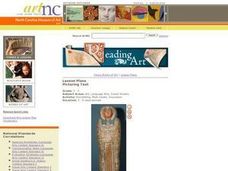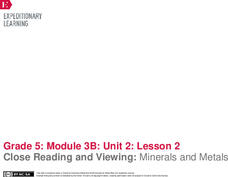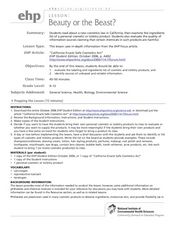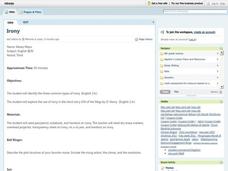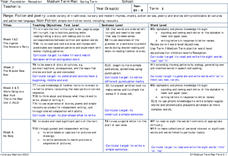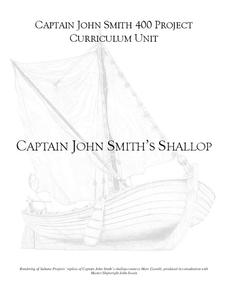Curated OER
Lesson 4: Fact and Opinion - Rosa Parks: My Story
Sixth graders examine implicit and explicit opinions in a text about Rosa Parks. In this explicit and implicit opinions lesson, 6th graders participate in direct teaching, guided practice, and independent practice while reading an...
National WWII Museum
A New War Weapon to Save Lives
Young historians view and analyze photos and documents from WWII that are related to blood transfusions and blood plasma. A demonstration of correct and incorrect blood donors visually shows the importance of knowing blood type. After...
Curated OER
Picturing Text
Students, through observation and discussion about the Coffin of Djed Mut, make connections between hieroglyphs and the English writing system. They create their own visual story using symbols that represent words.
Curated OER
Inferring Vocabulary Meaning
Explore the meaning of unknown words! Read All I See with your class, having them complete the inference chart provided while reading. They select unknown words, guess their meanings, and identify what other words or pictures helped them...
EngageNY
Reviewing Conventions and Editing Peers’ Work
Encourage young writers to edit text based on conventions. After reviewing the conventions, fourth graders watch a teacher demonstrate how to revise a paragraph for correct spelling, capitalization, punctuation, or dialogue. Then, pairs...
Curated OER
Miss Nelson Is Missing/Miss Nelson Is Back- Lesson 4
Students compare two stories. For this compare and contrast lesson, students read Miss Nelson is Missing and Miss Nelson is Back. Students brainstorm similarities and differences in the two stories, use a Venn Diagram to compare,...
Curated OER
Peter and the Starcatchers: QAR Strategy
Examine different types of questions while studying Peter and the Starcatchers. After learning about the different types of questions, pupils read passages from the text, answer the questions, and label each question with its...
EngageNY
Analyzing Main Ideas and Details: Why Care about Water?
Pay attention to details! After completing text-dependent questions about paragraphs 10-12 of "Water is Life," scholars view the video "Why Care about Water. "They view the video three times and use a Main Idea and Details note-catcher...
Institute for the Professional Development of Adult Educators
Using Context Clues with Signal Words
When you come across an unfamiliar word in a text, do you skip it and move on? Practice using context clues to identify words you don't know with a thorough set of language arts lessons. The resource reinforces close reading and critical...
EngageNY
Close Reading and Viewing: Minerals and Metals
How easy is it to live off the land? Scholars read Minerals and Metals in Your Life and discuss how Canada's natural resources meet the needs of the people. Pupils watch a brief video and discuss the gist of the text and video. They then...
Curated OER
Beauty or the Beast
Does the FDA really intend to protect public health? Spark a debate in your chemistry or health class by using this article, titled "Beauty or the Beast." It questions the safety of cosmetics and toiletry products, govenment regulations,...
Curated OER
Phineas Gage: Notecard Vocabulary Strategy
Understanding the vocabulary in a text, especially a text like Phineas Gage: A Gruesome but True Story About Brain Science that includes quite a few technical terms, can be the key to understanding the text as a whole. Learners focus on...
Science Matters
Energy Transfer and Transformation
When you take a simple task and create an exceptionally difficult way to complete it, it is known as a Rube Goldberg machine. These machines are filled with many types of energy transfers and energy transformations. Here, pupils watch...
National Wildlife Federation
What's Your Habitat?
How are third graders like rabbits? They both live in habitats and require food, water, and shelter to survive! An educational science lesson encourages your learners to think about their own habitats and survival needs, before comparing...
Curated OER
Irony
What are the three types of irony? High schoolers engage in a lesson about the use of irony while reading O.Henry's short story "Gift of the Magi." They'll discuss rising action, climax, and resolution in the text before highlighting the...
Curated OER
Children's Picture Books
Fifth graders will enhance their typing skills and practice using Pages, a software for Mac computers, by writing their own children's book. Note: This lesson plan refers to a template that is not included, however, you can adapt this...
Curated OER
Locating And Utilizing Information Using The Internet
Third graders practice typing in a web address to find a specific web page and how to use a search engine to locate specific information. They access a search engine to locate information about geology to answer the questions on a quiz.
Curated OER
My Reading Words in My Social Studies Book?
Connect social studies and language arts using this resource. After studying root words, have learners locate five words from their social studies book that have a prefix, suffix, or root word. This puts a new twist on practicing basic...
Curated OER
Fact Versus Opinion
Young learners distinguish statements as fact or fiction. After exploring a newspaper, they determine the type of information it contains. They read editorial articles and discuss the differences between the editorial page and the front...
Curated OER
Fiction and Poetry
Students explore fictional text and poetry. They explore the story structures used in the types of texts and examine the language patterns used. Students practice tracking text in the correct manner.
Google
Intermediate 4: Searching for Evidence for Research Tasks
Online resources take many forms: blogs, search engines, news websites, documents, wikis. In order to conduct effective research, pupils should become familiar with different formats so that they can more easily choose suitable sites for...
Google
Beginner 4: Searching for Evidence for Research Tasks
Having a strong searching skill set can make a research project much easier and much for successful for pupils. Tackle finding evidence with the ideas included here. The ultimate goal is for class members to learn the stepping stones...
National Endowment for the Humanities
Life Before the Civil War
American life before the Civil War was very different from American life today. To show this difference in a full spectrum, learners compare two communities that illustrate the differences between Northern and Southern life. Throughout...
Curated OER
Captain John Smith's Shallop
Young explorers, all aboard the shallop to discover how early European explorers would navigate the American coastline to find resources, map terrain, and trade with Native American tribes.




